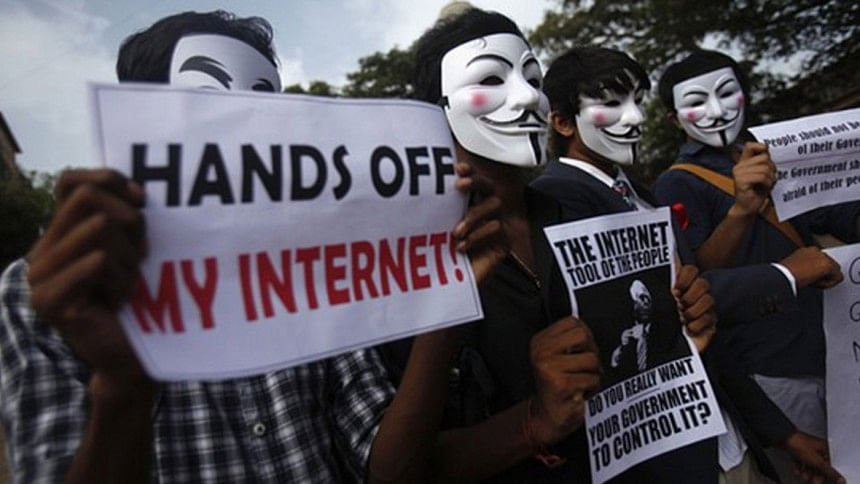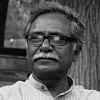The case for unfettered internet freedom

As human beings, we enjoy the right to think and express ourselves. We also enjoy the right to privacy. However, in this age of exponential growth in information and communication technology (ICT), instead of enjoying those rights to the fullest, we are being subjected to serious curtailment of such fundamental freedoms. The irony is, the violators are both state and non-state actors—in effect abusing technology in conducting such acts, and the laws and institutions that are meant to protect us from abuse have essentially become instruments to perpetuate it. Squashed between cyber-harassment and the surveillance state, the space for freedom of expression online has now shrunk more than ever. These observations were made at a webinar on "Internet freedom and rights in the context of digital Bangladesh" organised by Nagorik, a platform for human rights and rule of law, on July 4, 2021. The webinar heard a cross section of people who endured cyber-bullying by non-state actors and of the high-handedness of state agencies.
A former vice president of Shamsunnahar Hall student's union,Tasnim Afroz Emi, stated that she was subjected to a series of internet bullying incidents after she shared her thoughts on Facebook. When she sought support from the authorities, the police refused to register her complaint. Afroz was later picked up for her participation in the anti-quota movement and during her interrogation by the police, she was forced to give up the passwords to her e-mail and Facebook accounts. "The harassment of the authorities and the repeated attacks on my character (by the cyber miscreants) caused immense psychological harm. They also threatened my family. I could not take it anymore and decided not to pursue politics," she stated. A young social entrepreneur and activist, Lamia Tanjin Tanha shared her own experience of being cyber-bullied. She said that even though she refrained from posting any of her photographs on her Facebook account, she began receiving unsolicited obscene photos and comments. When she shared her problem with her peers, Tanha was baffled to see that "instead of expressing solidarity and concern, they appeared to be blaming me for my problem." As she is engaged with the rights of transgender people, she is often asked over the internet if she belongs to that community. Tanha noted that intolerance and hatred towards the LGBTQ+ community prevents members from engaging with the internet.
In narrating her own experience, poet and author Rokeya Lita stated that she became a target of cyber bullying after publishing a novel on the Chittagong Hill Tracts and writing on homosexuality. "I was threatened with rape and my photoshopped images were distributed on the internet," she stated. In dealing with said harassment, she was forced to put her Facebook account under a strict privacy mode and subsequently gave up writing for a while. All of this affected her career as a writer. Lita wondered, "why are the laws that are framed to provide protection from cyber-bullying not able to give us protection?" As she asserted, "Violence against women should not be a matter of concern of women only."
While social media empowers its users, it has also become an instrument for state surveillance. Expressing his concern in the use of the internet as an instrument of surveillance in recent years, Professor Sumon Rahman felt internet freedom enjoyed its golden age during the pre-surveillance period. In his intervention, a tech entrepreneur participant highlighted the issue of internet inequality and stated that executing arbitrary blockages of internet services without assessing its impact often brings about unintended consequences for the sector. "The government cannot do this without notice," he argued. There has to be a dedicated technology wing in every department so that policy coordination and coherence across the sectors are attained.
The webinar recalled the commitment made by senior state functionaries during national elections in the recent past and in transforming Bangladesh into "digital Bangladesh'". Based on the experiences shared by victims of cyber-bullying and state agencies' handling of those situations, the webinar noted that the laws that have been framed and the institutions that have been tasked to enforce the laws have thus far failed to protect the victims. Instead of ensuring public security to express their opinions, the Digital Security Act 2018 acts as a threat to people's rights. Fear and harassment have multiplied in digital life. The problem has been further compounded by the state's near inaction against, if not patronage of, the perpetrators of online harassment and violence.
All these effectively work to silence those who represent a multiplicity of thoughts and remove them from the cyber-space. "You will be able to think, but not be able to publish those thoughts. You will not be able to keep your thoughts to yourself because of surveillance," observed lawyer panelist Hasnat Quaiyum. The existing legal and institutional architecture is not only failing to protect citizens' right to freedom of expression on the internet, but also appear to be framed with the intent of violating these freedoms and this is a worrisome development, the session chair noted. The panelists raised the fundamental question of whether laws that undermine constitutionally guaranteed and internationally chartered fundamental freedoms can indeed be treated and respected as laws.
The participants were reminded of the five principles of the charter of Internet Freedom adopted in 2012. Included among those were: freedom of expression, access, openness, unfettered innovation and privacy of data pertaining to devices. It was noted that, despite the government's observance of December 12 as Digital Bangladesh Day (celebrating Internet Freedom), bloggers, cartoonists, artistes, rights activists, journalists and teachers have been periodically detained and incarcerated, and social media has been subjected to rampant censorship, blockages and filtering. Many, including women and children, are being subjected to cyber bullying, hate speech, gendered surveillance, sexual harassment and other forms of abuse over the internet, and there is little engagement of the people in the framing of the laws that have been put in operation.
There was unanimity over the belief that existing laws and institutions have been unable to address the challenges presented by the digitalisation juggernaut, and there is an urgent need to establish a comprehensive and accountable national system catering to the needs of citizens, framed along international laws and standards, which ensures that the internet remains an open forum for citizens to express their opinions without fear of retribution. There was acknowledgement of the need for research to assess the emerging critical issue of women in the digital space and how the use of ICT can open up new possibilities for activism and agency, and the formation of what Nancy Fraser has called "subaltern counter politics" among socially marginalised women. The participants felt that any intervention to curb internet use should be based on legally justifiable objectives respecting the necessity and proportionality principles, and the state should refrain from all forms of filtering and blockages and also impartially investigate the cases of breach of privacy. The state must discard the practice of targeting dissenting voices and political opposition and withdraw cases against them. The state should commit to and ensure that no one is subjected to internet surveillance without due authorisation from the Court.
The participants shared the view that ideas and opinions should be contested by putting forward contra ideas and opinions, and not by suppression through cyber-bullying or denial of internet freedom. They also felt that the best antidote to the curtailment of internet freedom is a united voice and collective resistance against all freedom-curtailing actions of state and non-state actors.
C R Abrar and Anu Muhammad are academics, Barrister Jyotirmoy Barua is an advocate of the Supreme Court of Bangladesh and Rezaur Rahman Lenin is an academic activist.



 For all latest news, follow The Daily Star's Google News channel.
For all latest news, follow The Daily Star's Google News channel. 



Comments